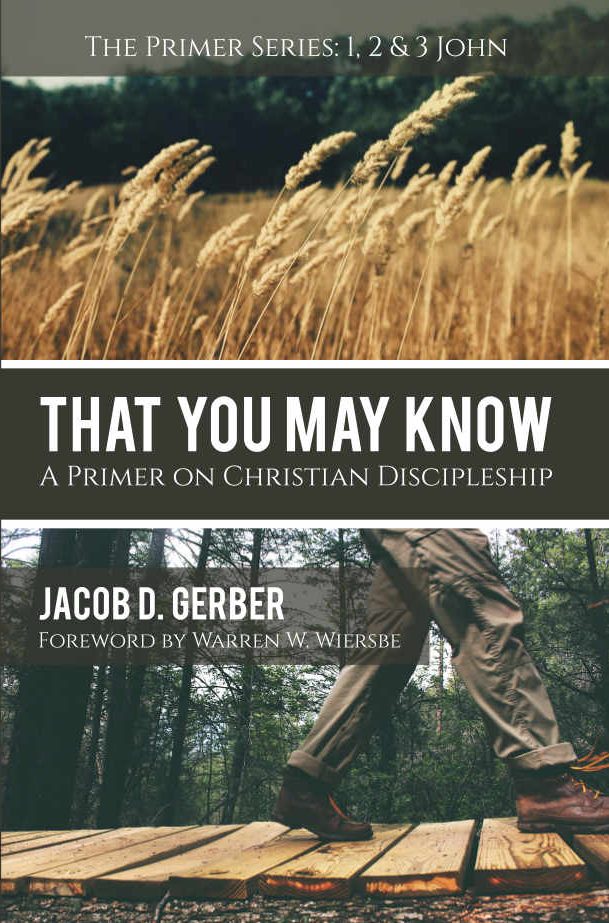Books

While there are many books written about Christian discipleship, there are not nearly enough books on discipleship that primarily expound the Bible itself. The Apostle John wrote three letters, however, with the main purpose of helping disciples to grow.
That You May Know: A Primer on Christian Discipleship is an enriching study that will lead you through John’s teaching on following Jesus as a disciple.
This book is more than a commentary and more than a topical book on the subject of Christian discipleship. Instead, this is a primer on Christian discipleship written as a careful reading of God’s word in 1, 2 & 3 John. It’s ideal for your own individual devotional reading or as a helpful resource for your group Bible study.
Download the First Two Chapters of That You May Know for Free
Bible Studies: Paul's Letter to the Philippians
Studies from my forthcoming pastoral commentary on Paul’s Letter to the Philippians, Have This Mind: A Primer on the Cruciform Life.
Access the complete set of Bible studies from Philippians here.
Bible Studies: The Gospel of John
Access the complete set of Bible studies from the Gospel of John here.
John 1:35–51: The Call of Jesus
After John the Baptist’s proclamation (John 1:29), Jesus’ first priority is to gather a core group of disciples. (Exposition of John 1:35–51)
John 1:19–34: The Revealing of Jesus
The subservient, ministerial mission of John the Baptist heralds the coming of the one who baptizes with the Spirit (John 1:33). (Exposition of John 1:19–34)
John 1:1–18: The Identity of Jesus
The Prologue of the Gospel of John reveals the identity of Jesus as the Creator, the Redeemer, and the Mediator. (Exposition of John 1:1–18)
Bible Studies: The Book of Genesis
Access the complete set of Bible studies from Genesis here.
Genesis 17:15–18:15: The Company of Abraham
Abraham and Sarah struggle to believe God’s promises to give them a child. So, God eats and drinks with us to overcome the limitations of our faith. (Exposition of Genesis 17:15–18:15)
Genesis 17:1–14: The Circumcision of Abraham
In Genesis 17, we discover the significant of covenant signs: God gives covenant signs to ratify our claim to his covenant promises. (Exposition of Genesis 17:1–14)
Genesis 16:1–16: The Concubine of Abram
When our faith is stretched, we start to believe that God has forsaken us. But even when God seems silent, God sees, and God hears. (Exposition of Genesis 16:1–16)
Genesis 15:1–21: The Covenant of Abram
What do we do when the honeymoon is over in our relationship with God? God’s covenant assures us in suffering that God will keep his promises. (Exposition of Genesis 15:1–21)
Genesis 14:17–24: The Coffers of Abram
Abram’s interaction with Melchizedek illustrates that faith may lead us to empty our hands, but faithlessness will leave us empty-handed. (Exposition of Genesis 14:17–24)
Genesis 14:1–16: The Custodianship of Abram
Worldly consumers believe that the world exists for their benefit. God’s custodians believe that the world exists for the benefit of Christ and his kingdom. (Exposition of Genesis 14:1–16)
Bible Studies: Paul's First Letter to the Corinthians
Access the current set of Bible studies from 1 Corinthians here.
Bible Studies: The Letters of John
Access the complete set of Bible studies from the Letters of John here.
Bible Studies: The Gospel of Luke
Access a handful of Bible studies from the Gospel of Luke here. These were studies written during the Advent season of 2018. At the moment, I do not have plans to continue working through the Gospel of Luke; however, I wanted to make these few studies available online for whomever may benefit from them.
Bible Studies: The Book of Ecclesiastes
Access the complete set of Bible studies from the Book of Ecclesiastes here.
Bible Studies: The Gospel of Matthew
Matthew 18:21–35: Forgiving Your Brother
Jesus reminds us of God’s lavish forgiveness for us and then issues a pointed command: forgive your brother from your heart. (Exposition of Matthew 18:21–35)
Matthew 18:15–20: Gaining Back Your Brother
In Matthew 18, Jesus teaches us how to love back our brothers, since Jesus administers his kingdom through the ministry of the church. (Exposition of Matthew 18:15–20)
Matthew 18:10–14: Leaving the Ninety-Nine
Jesus explains the very reason why he himself came from the Father into the world: Jesus came to seek and to save the lost. (Exposition of Matthew 18:10–14)
Matthew 18:1–9: Humility like a Child
Jesus redefines greatness in the kingdom of heaven as humility, for our great King humbled himself even by death on a cross. (Exposition of Matthew 18:1–9)
Matthew 17:24–27: The Sons are Free
Whether Jesus pays the temple tax is a question of freedom vs. obligation. Jesus avoids every stumbling block to our salvation except the cross. (Exposition of Matthew 17:24–27)
Matthew 17:14–23: Nothing Will be Impossible for You
Jesus commends faith that can move mountains—especially the mountain of enduring suffering. Faith empowers believers to endure suffering. (Exposition of Matthew 17:14–23)















